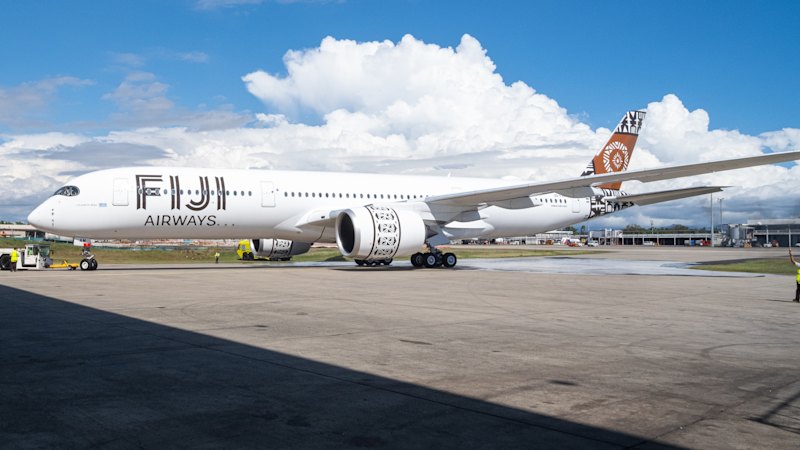
A Cairns Airport spokesperson said the airport is pleased with “how well it has been received both locally and by international markets”. Meanwhile, the airline’s Oneworld membership allows it to target Qantas frequent fliers.
“Our product outranks some of the best airlines in the world, and when people experience our long haul flatbeds with amazing in-flight menus and great in-flight entertainment, it is world-class,” Scurrah said.
The airline also connects Fijians across the nation.
“Because of that, we’re seeing a rapidly increasing amount of business travellers that are connecting through Fiji to go to all the points in our network.”
In 2024, the airline won Skytrax Best Airline in Australia and Pacific.
Fiji Airways also flies from Brisbane, Sydney, Adelaide, Canberra and Melbourne and connects to Honolulu, San Francisco, Los Angeles and Vancouver. In Asia, Fiji Airways flies to Tokyo, Hong Kong and Singapore.
Yet, closer to home, Fiji Airways is critical to keeping the people of the sprawling archipelago connected, with Scurrah saying it shares a “likeness” to Rex Airlines and “to another degree” regional carrier QantasLink.
Business class aboard a Fiji Airways A330. But can the airline expand its fleet enough to grow more?
In this case, the airline is not just covering 330 islands over 18,300 square kilometres, but also the broader Pacific region.
“There is a strong economic need for Fiji Airways to operate the way that we do for the prosperity of the country,” said Scurrah.
And yes, there are some similarities to the geography of connecting regional Australia, Scurrah says. “But like a lot of the routes in Australia that are essential routes, there are arrangements with government to make sure that it financially works for the airline, and that’s the circumstance we have here in Fiji.”
Any plan to expand the airline while bringing more tourists into Fiji faces challenges.
Fiji’s Deputy Prime Minister and Minister for Tourism Viliame Gavoka recently lamented the lack of accommodation for tourists. “When demand is high, we run out of rooms,” Gavoka said, according to the Fiji Times.
Loading
There are also questions about how much Scurrah can grow Fiji’s business after its extensive expansion under his predecessor Andre Viljoen. In 2023, it boosted seat capacity by 47 per cent while adding flights to Canberra and Noumea.
Ellis Taylor, Asia Pacific editor at aviation industry tracking service Cirium, said: “Future growth is a little harder to see because of its relatively small fleet which is largely based around three types.”
The airline has 23 planes, including Boeing 737 Max 8s, Airbus A330s and A350s, and smaller turboprops for domestic use.
The Airbus wide-body planes “are perfectly suited” for medium-haul routes from Fiji into Asia and North America, while the 737s are well suited to Australia, which will remain a major source market, said Taylor.
“But growth of new east coast destinations [in Australia] may be tricky, with most of the major destinations covered.”
A Fiji Airways A350 on the ground.
Fiji Airways already faces “great amounts of competition” from Jetstar, Virgin Australia and Air New Zealand. Qantas will also be competing on the traffic to North America, at the premium end of the market, “whereas Fiji Airways has made a niche of targeting more price-sensitive customers to gain a foothold in that market”, said Taylor.
In 2023 – the latest year for which the numbers are available – pre-tax profit stood at $FJ131.81 million ($88.5 million) on earnings of $FJ1.8 billion. In 2022, the company posted a FJ$164.3 million loss on revenue of $FJ1.06 billion.
Keeping the airline’s finances – any airline’s finances – robust is a challenge that has become acute in the years since COVID.
The Fiji Airways lounge in Nadi.
Scurrah should know; he took over as CEO of Virgin Airlines in 2019 as the company struggled with mounds of debt and unprofitable routes.
When COVID hit in 2020, Scurrah was already dramatically restructuring Virgin’s fleet. When US-based Bain bought Virgin five months later, it effectively followed the road map Scurrah had sketched.
Scurrah believes that after COVID airlines have to be more uncompromising on maintaining costs, almost structuring balance sheets for another crisis. His takeaway from his experience at Virgin: airlines “need to be a cost leader to stay competitive”.
Navigating a competitive market like the Pacific could be the perfect setting for Scurrah to apply the lessons learnt with Virgin.
The Business Briefing newsletter delivers major stories, exclusive coverage and expert opinion. Sign up to get it every weekday morning.





